| Secretaries of State Gather for Winter
Meeting ... 1 of 5 > |
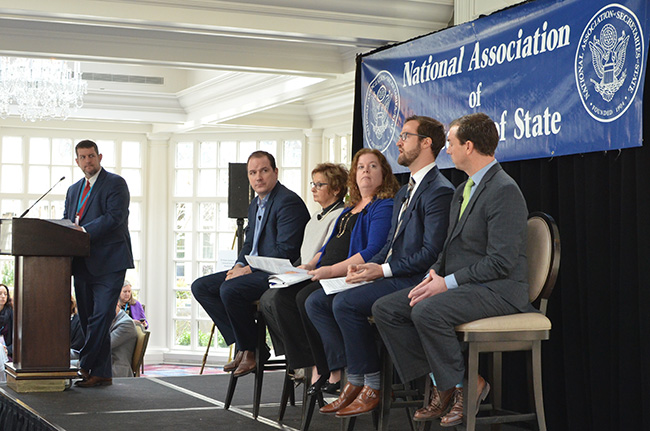 |
| Feb. 16-19, 2018 - The nation's
secretaries of state gathered in Washington, DC for their annual winter
meeting. Amidst a spate of recent news about Russian interference
in the 2016 election, cybersecurity was a major subject of
discussion. Elections in the United States are very decentralized, being run by state and local officials. In forty states the secretary of state serves as the chief state election officer, while local election administrators do everything from preparing ballots to tallying votes. In Jan. 2017 the U.S. Department of Homeland Security designated election infrastructure as a critical infrastructure subsector, giving the federal government a greater role in the election space. Some tension and frustration between the secretaries of state and DHS officials were evident. Indiana Secretary of State Connie Lawson observed the relationship is "going about as well as any arranged marriage could go" although she did say that communication is improving. (Above) Matt Masterson, chairman of the U.S. Election Assistance Commission moderates a session on "Planning Now, Looking Ahead to November 2018." Participants included (left to right) Robert Kolasky, Acting Deputy Under Secretary for National Protection and Programs Directorate at the U.S. Department of Homeland Security; Indiana Secretary of State Connie Lawson; Susan Parnas Frederick, senior federal affairs counsel at the National Conference of State Legislatures; David Forscey, policy analyst in the Homeland Security & Public Safety Division of the National Governors Association; and Noah Praetz, director of elections in Cook County, Illinois. |
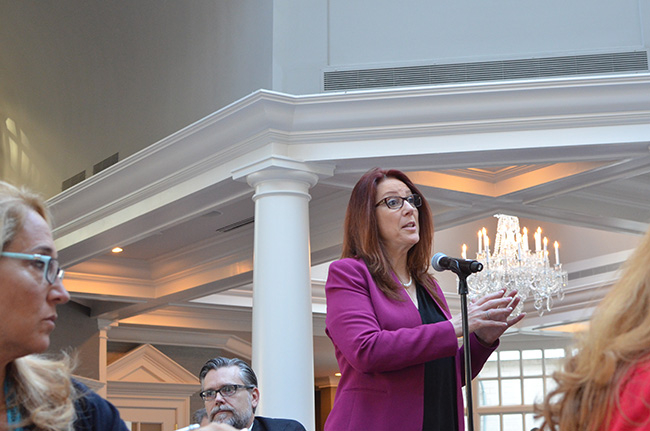 |
| Washington Secretary of State
Kim Wyman poses a question during the opening breakfast session on
"Cybersecurity Best Practices for Elections." Wyman, a
Republican,
was elected in 2012 and re-elected in 2016. |
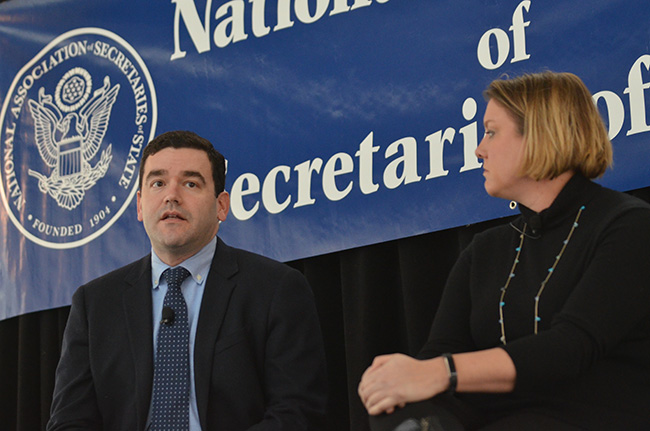 |
| The Saturday luncheon session focused on "The Role of Social Media in Democracy." Carlos Monje, director of public policy and philanthropy (U.S. and Canada) at Twitter, and Katie Harbath, director of global politics and government outreach at Facebook, spoke about what their companies are doing to prevent abuses such as happened in 2016. |
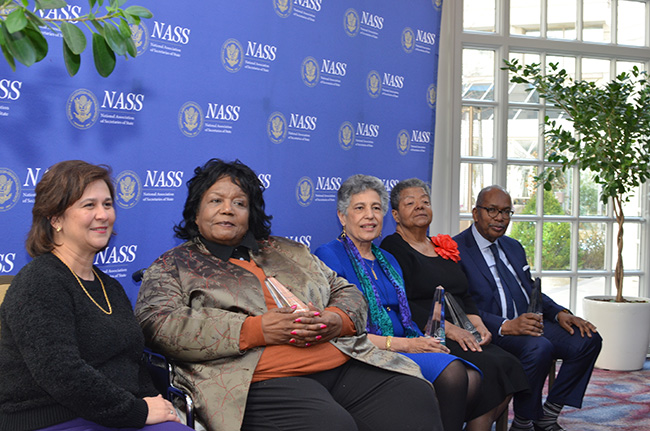 |
| During the luncheon on Sunday,
NASS presented its Margaret Chase Smith American Democracy Award to
members of the Little Rock Nine, who in 1957 became the first
black students to attend Little Rock Central High. After the
lunch, secretaries of state posed for photos with the group. (l to r) Arizona Secretary of State Michele Reagan; Melba Pattillo Beals, Carlotta Walls LaNier, Elizabeth Eckford and Earnest Green. |
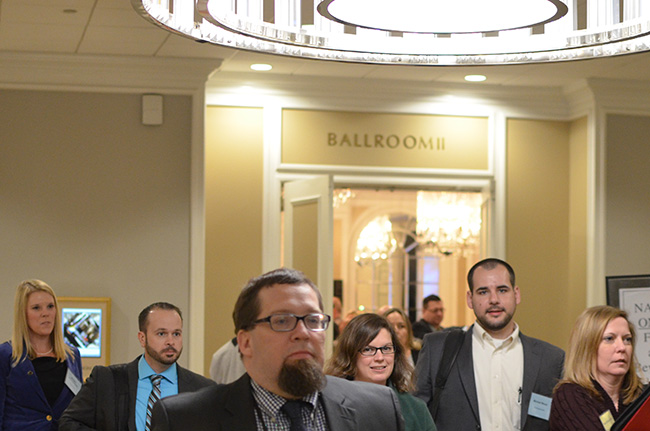 |
| The National Association of
State Election Directors (NASED) met concurrently with NASS, also at
the
Fairmont. (Above) NASED meeting attendees file out of a briefing
by leaders of the U.S. Election Assistance Commission on the EAC's
activities. |
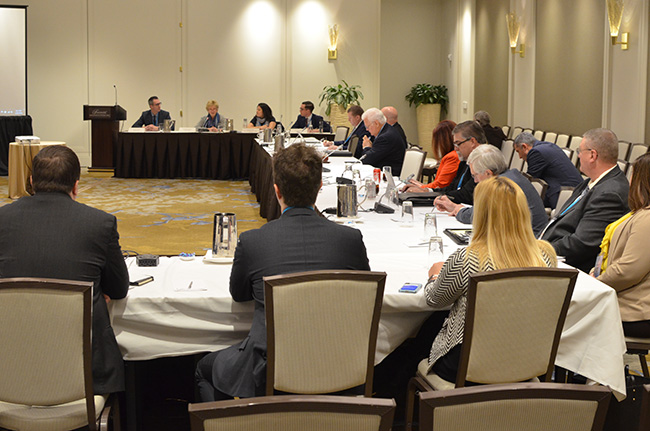 |
| A Sunday afternoon workshop on "Filling the Gaps in State Cybersecurity Workforce" was well attended. |
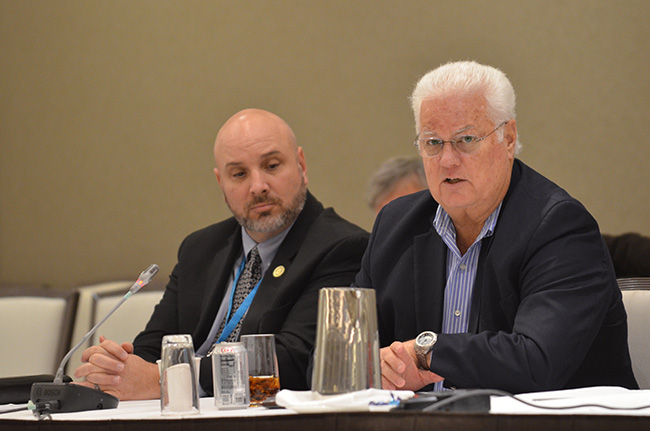 |
| Florida Secretary of State Ken
Detzner makes a point during the workshop. Detzner, a Republican,
was appointed to
his position by Gov. Rick Scott in Feb. 2012 and served an earlier
stint under Gov Jeb Bush. |
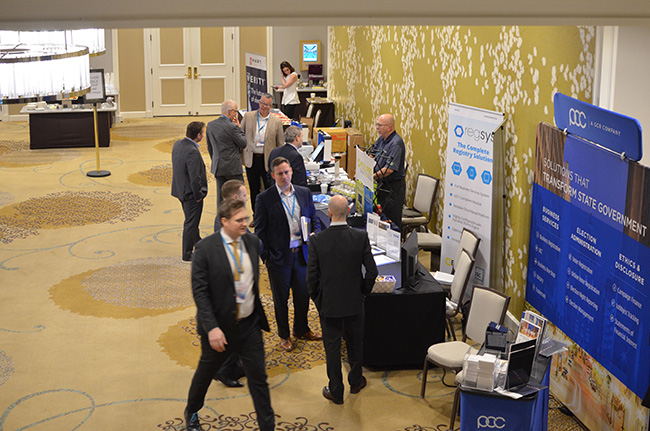 |
| Two dozen vendors promoted a
variety of
products including voting systems, voter registration systems, poll
books, voting systems, election night reporting systems, and security
services. |
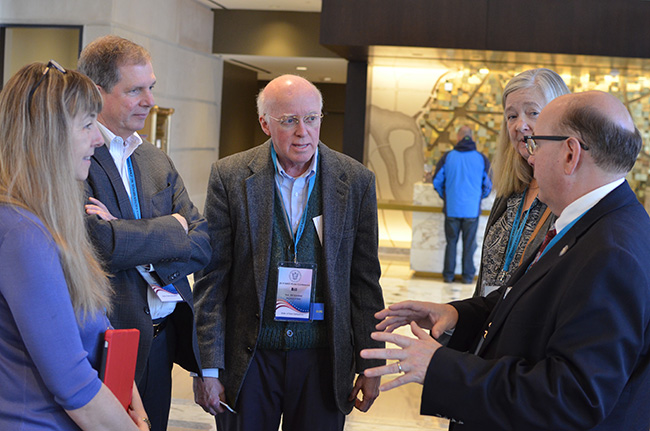 |
| Maine
Secretary of State Matthew
Dunlap (right) regales New Hampshire Secretary of State Bill Gardner
(center), Deputy Secretary of State David M. Scanlan, and two staff
members with an account of his
state's experience with ranked-choice voting. In Nov. 2016 Maine
voters passed a referendum to institute ranked choice voting in
statewide elections, but in Oct. 2017 the state legislature moved to
delay implementation until 2021. Supporters of ranked-choice
voting are pursuing a people's veto and have also taken the matter to
court. Gardner is the longest current serving secretary of state; he was elected to the position by the General Court (state legislature) in late 1976 and has been re-elected by the legislature every two years since then. Dunlap is also elected by his state legislature; he has served in the position since Jan. 2013 after an earlier stint from 2005-11. According to NASS 38 secretaries of state are elected by popular vote, 10 appointed, and three selected by state legislatures; the current partisan balance is 32 Republicans, 22 Democrats and one independent (+); and 39 are male and 16 female. Responsibilities of individual secretaries of state vary from state to state, and can include elections, public records, business registration and other administrative functions. Links National Association of Secretaries of State National Association of State Election Directors DHS National Protection and Programs Directorate U.S. Election Assistance Commission Belfer Center Defending Digital Democracy Project (D3P) The Election Center/National Association of Election Officials Republican Secretaries of State Committee (RSSC) Democratic Association of Secretaries of State (DASS) |
| ....next > |

